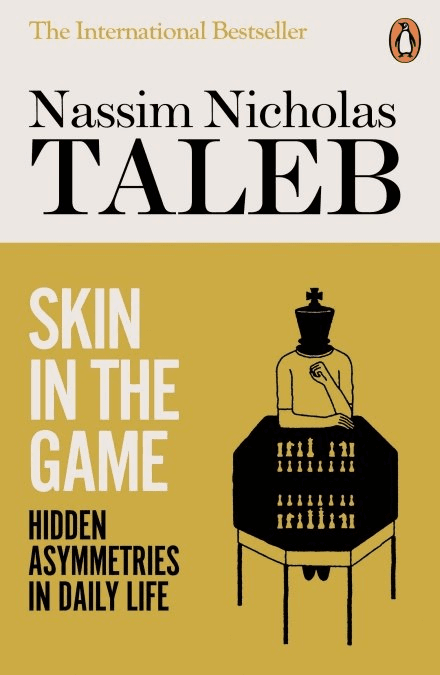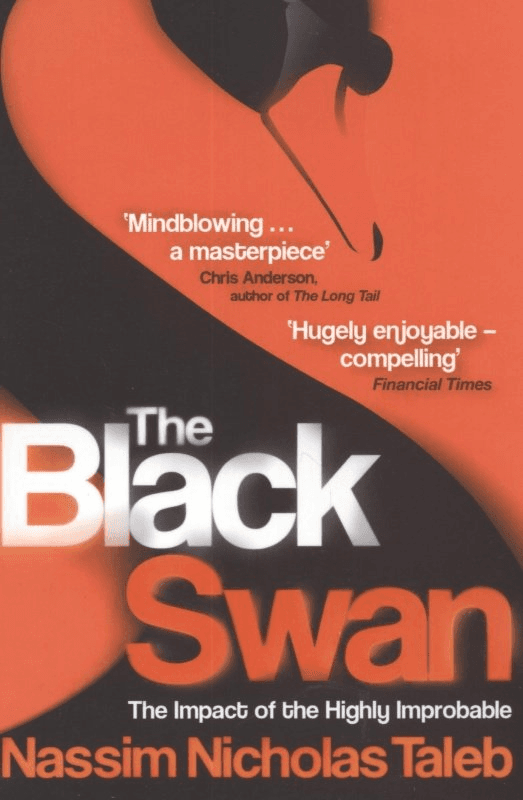The Black Swan vs. Skin in the Game: Hidden Asymmetries in Daily Life
The Black Swan
"The Black Swan" by Nassim Nicholas Taleb is a seminal work that explores the profound impact of rare and unpredictable events, termed "Black Swans." Taleb argues that these events, which are often overlooked or underestimated, have massive consequences on our world. He highlights the limitations of traditional forecasting methods and emphasizes the need for resilience and adaptability in the face of uncertainty. Blending philosophy, economics, and personal anecdotes, Taleb provides a compelling critique of our understanding of risk and uncertainty. This book is essential for anyone interested in risk management, economics, and understanding the unpredictable nature of our world.
Skin in the Game: Hidden Asymmetries in Daily Life
Skin in the Game: Hidden Asymmetries in Daily Life is a nonfiction book by Nassim Nicholas Taleb, published in 2018. Taleb’s main point is pretty simple: people should share in the risks of the decisions they make. If you benefit from something, you should also face the downsides if things go wrong. He calls this having “skin in the game.” Without that, people can make reckless choices that hurt others while staying safe themselves. The book covers everything from politics and business to religion and everyday life. Taleb doesn’t hold back on criticism. He talks about how some policymakers and financial experts make decisions that affect millions but don’t suffer when those decisions backfire. He uses examples like bankers profiting during booms but getting bailed out during crashes. Taleb also goes after what he calls “Intellectual Yet Idiot” types—educated people who, in his view, complicate things and give advice without understanding real-world consequences. He argues that real k...

Reviews
Reviews
| Item | Votes | Upvote |
|---|---|---|
| Insightful exploration of unpredictability | 1 | |
| Challenges conventional wisdom | 1 | |
| Rich with real-world examples | 1 |
| Item | Votes | Upvote |
|---|---|---|
| Complex and dense material | 1 | |
| Occasional digressions | 1 | |
| Some readers find Taleb's tone abrasive | 1 |
| Item | Votes | Upvote |
|---|---|---|
| Insightful and provocative arguments | 1 | |
| Applies to various aspects of life | 1 | |
| Engaging and accessible writing style | 1 | |
| A sensible approach to ethics | 1 |
| Item | Votes | Upvote |
|---|---|---|
| Some arguments can be repetitive | 1 | |
| Taleb's confrontational tone may not appeal to everyone | 1 |
Frequently Asked Questions
'The Black Swan' and 'Skin in the Game' both offer unique and valuable insights, although they approach different themes. 'The Black Swan' is highly regarded for its exploration of rare, unpredictable events and their profound impact, making it essential for understanding risk and uncertainty. It is rich with real-world examples and challenges conventional wisdom, though some may find the material complex and dense. 'Skin in the Game,' on the other hand, focuses on the importance of personal risk in decision-making and accountability. It is engaging and accessible, with a sensible approach to ethics, but some arguments may feel repetitive. The choice between the two depends on whether you are more interested in understanding unpredictability and risk ('The Black Swan') or the ethical implications of personal investment in outcomes ('Skin in the Game').
'The Black Swan' is likely the better choice for those specifically interested in risk management. The book delves deeply into the impact of rare and unpredictable events, highlighting the limitations of traditional forecasting methods and emphasizing the need for resilience and adaptability. While 'Skin in the Game' also touches on risk, its primary focus is on personal accountability and the ethical dimensions of having a stake in the outcomes of decisions. Thus, for a comprehensive understanding of risk management, 'The Black Swan' is the more pertinent read.
'Skin in the Game' is generally considered more accessible to general readers. It features an engaging and accessible writing style, discussing the importance of personal risk in decision-making in a manner that is easy to grasp. 'The Black Swan,' while insightful and rich with real-world examples, can be complex and dense, which might make it challenging for some readers. If you are new to Taleb's works or prefer a more straightforward read, 'Skin in the Game' would be the better choice.
'Skin in the Game' offers more direct practical applications by emphasizing the importance of personal risk and accountability in various aspects of life, including ethics, politics, and economics. It encourages readers to consider the stakes involved in decision-making processes, making it highly applicable to everyday situations. 'The Black Swan,' while offering profound insights into unpredictability and risk, is more theoretical and focuses on understanding rare events and their impact. Thus, for practical daily applications, 'Skin in the Game' is more directly useful.
'The Black Swan' by Nassim Nicholas Taleb is a seminal work that explores the profound impact of rare and unpredictable events, termed 'Black Swans.' Taleb argues that these events, which are often overlooked or underestimated, have massive consequences on our world. He highlights the limitations of traditional forecasting methods and emphasizes the need for resilience and adaptability in the face of uncertainty. Blending philosophy, economics, and personal anecdotes, Taleb provides a compelling critique of our understanding of risk and uncertainty. This book is essential for anyone interested in risk management, economics, and understanding the unpredictable nature of our world.
Pros of 'The Black Swan' include its insightful exploration of unpredictability, its challenge to conventional wisdom, and its richness with real-world examples. However, the cons are that the material can be complex and dense, there are occasional digressions, and some readers may find Taleb's tone abrasive.
Nassim Nicholas Taleb is a scholar, statistician, and former trader, known for his work on the role of randomness, probability, and uncertainty in financial markets and life. He is the author of several books, including 'The Black Swan,' 'Antifragile,' and 'Fooled by Randomness,' which explore the impact of rare and unpredictable events.
'Skin in the Game: Hidden Asymmetries in Daily Life' is a nonfiction book by Nassim Nicholas Taleb that argues people should share in the risks of their decisions. Taleb emphasizes that if someone benefits from a decision, they should also face the potential downsides. The book critiques various sectors, including politics and finance, highlighting how decision-makers often escape the consequences of their actions. It explores themes of accountability and the importance of real-world experience over theoretical knowledge.
Nassim Nicholas Taleb is a Lebanese-American essayist, scholar, and statistician known for his work on risk, uncertainty, and decision-making. He is the author of several influential books, including 'The Black Swan' and 'Antifragile.' Taleb's writing often critiques conventional wisdom and emphasizes the importance of practical experience in understanding complex systems.
Pros of 'Skin in the Game' include its insightful and provocative arguments, applicability to various aspects of life, engaging writing style, and a sensible approach to ethics. However, some cons are that certain arguments can be repetitive, and Taleb's confrontational tone may not appeal to everyone.
The main themes of 'Skin in the Game' include accountability, the importance of sharing risks in decision-making, the critique of policymakers and financial experts who evade consequences, and the influence of stubborn minorities on societal choices. Taleb also discusses the concept of real knowledge being derived from practical experience rather than theoretical understanding.
Nassim Nicholas Taleb's writing style in 'Skin in the Game' is direct and sometimes blunt. He is known for his no-nonsense approach, which some readers appreciate for its clarity and honesty, while others may find it overly combative or confrontational.




















